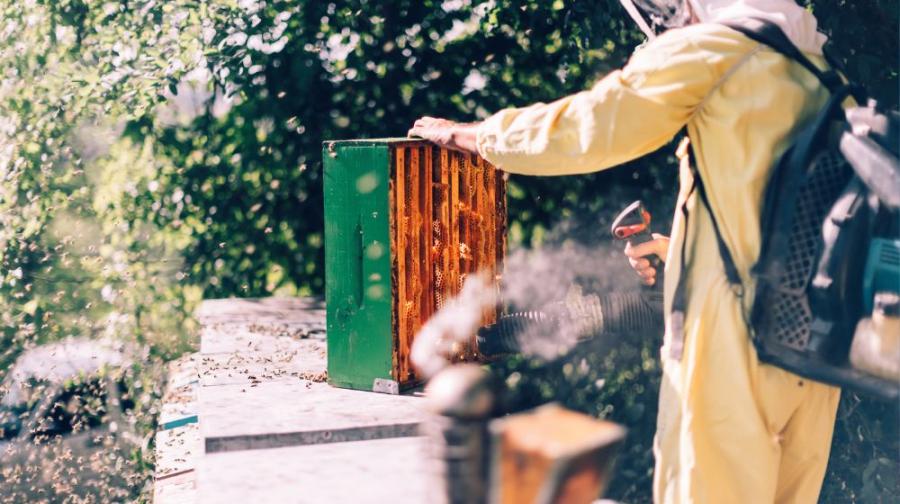Blessed are the Bees

Just when you think you’ve run out of the creatures of NUMC to write about, a subject presents itself. Bees!! It’s a bit distracting when you’re on the phone in the church office and you realize bees are circling above your head. Then a few days later Pastor Jerad is greeted by bees in the hallway outside his office and then numerous bees are discovered in Gregory’s office window (inside). Who do we call? Well of course Bruce Paulson, man of many talents, including tracking down where the bees are entering the building.
Funny side story about bees…a few years ago my adult niece decided to take up honey bees for a hobby and set up a couple of hives at her parents farm. It was a great hobby until winter came along and she convinced her parents that the bees could be kept in the unfinished cool basement of their old farmhouse over the winter. As long as the temperature stayed below a certain level the bees would remain in a dormant state. Did I mention she does not live with them? Everything was fine until one winter morning her parents came down stairs from the second floor and were met by hundreds of bees clinging to a window inside their house! Seems some unusually warm days caused the bees to “wake up” and somehow escape their winter accommodations in the basement. Luckily the bees were drowsy and had all gathered in one spot. Needless to say she received a frantic phone call from her parents and had a quick lesson on gathering a cluster of bees and returning them to their hive. The honey bees were rehomed to another location that spring and her honey bee hobby came to an end.
Meanwhile, back at NUMC...seems a PVC pipe outside the church office was the perfect place for entrance to the building and in fact, these weren’t bees at all, they were hornets. Yikes! So what’s the difference between bees and hornets? Glad you asked!
Bees and hornets are fascinating little creatures of God. They may look alike and belong to the same category of insects, but they are different insects. Bees are vegetarians, collecting pollen to feed their young, while hornets are carnivores, feeding on other insects. But both are actually good bugs! (Seriously) Bees are often considered beneficial to humans and the environment because they make honey and pollinate flowers. On the other hand, hornets are typically considered a nuisance to most of us.
While we may view hornets as pests with a painful sting, hornets do benefit the ecosystem. They are predators that serve a special function in controlling other populations of insects. Without hornets, insects like spiders, caterpillars, flies, and beetles would breed out of control and become a greater nuisance. Hornets control the populations of these pests by eating them – which is great unless you are the insects being eaten. Like the honey bee, hornets also serve an essential function to fruit and flowering plants. As they travel from plant to plant they pollinate the flowers. Despite their benefits to the ecosystem, hornets are still considered a hazardous pest when they make their homes in or around places where people work, live or play. When disturbed or provoked, hornets can become increasingly aggressive, and cause a painful sting. Since hornets do serve an important function they should be left undisturbed unless posing a direct threat, such as moving into the NUMC church office.
Bees are vitally important to agriculture and thus humans. According to the USDA, bees of all sorts pollinate approximately 75 percent of the crops grown in the United States. One out of every four bites of food you eat is courtesy of bee pollination. In a single day, one worker bee makes 12 or more trips from the hive, visiting several thousand flowers. A bee can travel up to five miles from the hive. Bees are very intelligent and researchers have even suggested that studying the actions of bees could help experts develop evacuation plans for humans in an overcrowded situation or help scientists understand where changes are taking place in the environment.
Unfortunately, the number of bees worldwide are dwindling due to pesticide use and loss of their natural habitat. It is essential that we protect bees in order to maintain our own well-being. What can you do to help? Your backyard and garden can be a vital resource for bees. Growing native flowers and leaving weeds to develop can contribute to bee health and numbers by providing food and shelter. Reducing landscaping activities, such as mowing or pruning, can help bees by increasing the amount of vegetation available.
Roman Catholic Bishop St. Francis de Sales (1567-1622) of Geneva wrote “the bee collects honey from flowers in such a way as to do the least damage or destruction to them, and then leaves them whole, undamaged and fresh, just as he found them.”
Bees are amazing and we humans can learn from them. They are found throughout the bible and in folklore. They are known for their intelligence, their hard-working spirit and in some cultures considered a messenger of Mother Nature. Whether bees are wise, messengers of God, or bringers of good fortune, they're a vital part of our world that we need to protect. As far as the hornets are concerned, whether we like them or not, they do have a purpose, just like all of God’s creations. Office hornet update: Thanks to Bruce Paulson the NUMC office hornet situation seems to be under control. Sandy Vesledahl - NUMC Office Administrator
